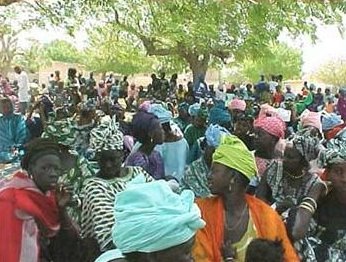DAKAR – About 150 communities in Guinea collectively abandoned the practice of female genital cutting – a landmark declaration in a country where more than 97 percent of women have undergone the ritual. Other countries are similarly abandoning the tradition…
Delegations led by women from each village converged on the central Guinean town of Lalya in early December to speak about genital excision and participate in the declaration.
 The Senegal-based NGO Tostan organised the Guinea declaration after working with communities to show how the traditional practice is harming individuals and communities.
The Senegal-based NGO Tostan organised the Guinea declaration after working with communities to show how the traditional practice is harming individuals and communities.
Khady Bah Faye, Tostan’s communications officer, told IRIN on Monday that the Guinea declaration shows that momentum against the harmful practice is growing in Africa. She said Tostan has also been getting requests for assistance from The Gambia, Burkina Faso and Benin. The NGO has also worked in Mali and is about to begin in Mauritania. More than 1,800 communities in Senegal have publicly abandoned the tradition in the past nine years, Faye said.
Various forms of female genital cutting are practiced in about 28 African countries –a tradition that has been practiced for 2,000 years, in the belief that it keeps women chaste and eligible for marriage.
Tostan Executive Director Molly Melching compares the phasing out of genital excision to the eradication of foot binding in China in the early 20th Century. That practice, which aimed to reduce foot size to make girls more attractive, disappeared in a generation.
Tostan uses theatre, role-playing, and other hands-on methods in local languages to educate communities and bring people together. The program relies on community members themselves reaching consensus about how they will deal with such issues as the environment, domestic violence, childhood marriage and genital excision.
“Once people agree on this they have new norms,” Melching said. “Before they thought [genital cutting] was necessary to create cohesion. When they learn it doesn’t there’s a new convention, new norms.”
Melching notes that although African men steeped in tradition were reluctant to alter their views on genital cutting, they began to change after they became aware of the dangers of genital excision. Previously, men and women did not discuss such issues.
“It’s really when they began to get the men, the leaders of the communities, particularly the imams, together with women to hear about what this has really meant in their lives and how it may have impacted their own daughters or nieces or their grandchildren that they began to realise that this has harmful effects,” said Ann Veneman, executive director of the United Nations children’s agency (UNICEF).
© IRIN– 4 Dec 2006 [This article does not necessarily reflect the views of the United Nations or its agencies.]




















That is wonderful news.
I’ve read about this practice and the terrible suffering it can cause women. I’m so pleased to read that the communities have come together and decided not to allow this anymore.